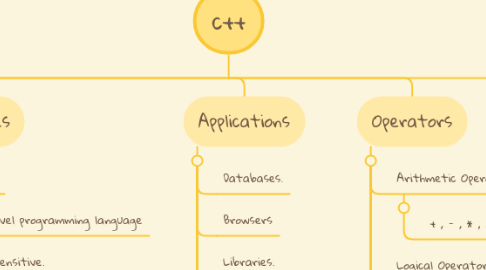c++
作者:Alaa Ali


1. Data Types
1.1. Primary
1.1.1. Int
1.1.2. Float
1.1.3. Double
1.1.4. char
1.1.5. string
1.1.6. void
1.2. user defined
1.2.1. class
1.2.2. structure
1.2.3. union
1.2.4. Typedef
1.3. derived
1.3.1. Function
1.3.2. Array
1.3.3. Pointer
1.3.4. Reference
2. Features
2.1. Simple.
2.2. High-level programming language
2.3. Case sensitive.
2.4. Popular.
2.5. Object-Oriented language
2.6. Platform or Machine Independent/ Portable.
2.7. Compiler-Based
2.8. DMA (Dynamic Memory Allocation)
3. Applications
3.1. Databases.
3.2. Browsers
3.3. Libraries.
3.4. Embedded Systems.
3.5. Graphics.
3.6. Banking Applications
3.7. Telephone Switches
3.8. Operating Systems
4. Operators
4.1. Arithmetic Operators
4.1.1. + , - , * , / , %
4.2. Logical Operators
4.2.1. && , ! , ||
4.3. Assignment Operator
4.3.1. = , += , -= , *= , /= , %=
4.4. Unary operator
4.4.1. ++ , --
4.5. Relational Operators
4.5.1. < , <= , > , >= , == , !=
4.6. Conditional Operator
4.6.1. ?;
4.7. Bitwise Operators
4.7.1. << ,>> , & , | ,^
5. Llibraries
5.1. Concepts library
5.1.1. <concepts>
5.2. Coroutines library
5.2.1. <coroutine>
5.3. Utilities library
5.3.1. <functional>
5.3.2. <cstdlib>
5.3.3. <csignal>
5.3.4. <csetjmp>
5.3.5. <typeindex>
5.3.6. <type_traits>
5.3.7. <typeinfo>
5.3.8. <bitset>
5.3.9. <bitset>
5.4. Dynamic memory management
5.4.1. <new>
5.4.2. <memory>
5.4.3. <scoped_allocator>
